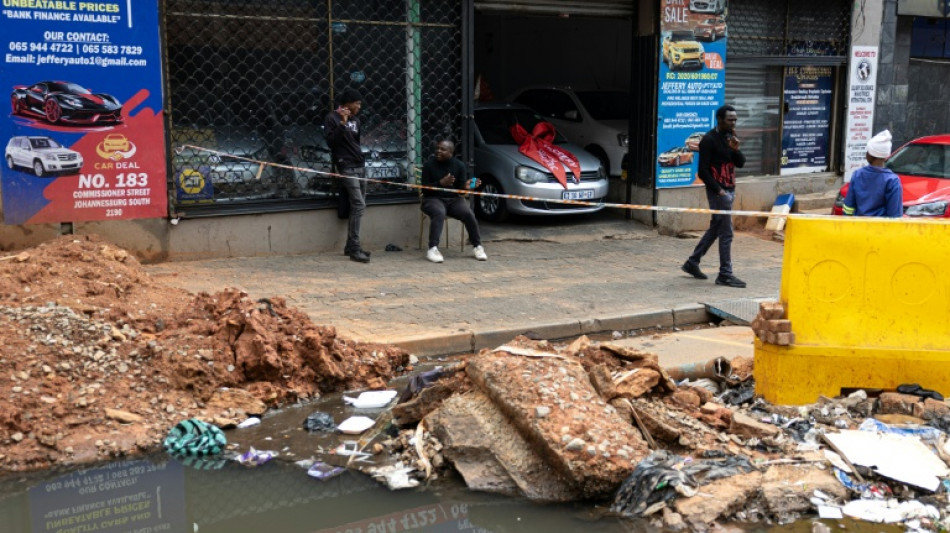

Johannesburg gets rushed makeover for G20 chiefs
When G20 leaders touch down in Johannesburg this month, they will be greeted by a city scrubbed, patched, and polished, all part of a last-minute summit gloss thrown over years of neglect.
The urban sprawl of almost six million people is home to Africa's richest square mile. In recent years, however, it has sunk into disrepair, with open sewers, potholed roads and crowded shacks of corrugated iron lining its fraying edges.
President Cyril Ramaphosa, dismayed by the decay, called the city's state "not pleasing" and ordered a clean-up to spare Africa's industry powerhouse global embarrassment.
Then the bulldozers rolled in.
"It is such a huge shame it had to take other people coming to South Africa for action to be taken," said Abigail Thando, 34, an insurance broker scouting for clients along the streets of Johannesburg's student district.
Nearby, municipal trucks hauled garbage as private contractors were widened a junction overlooking the Nelson Mandela Bridge.
Yet for many locals, the transformation feels cosmetic and belies their suffering.
Resources were being funnelled into high-visibility zones while poorer neighbourhoods remained untouched, said garbage recycler Ricco Tshesane.
"There is no improvement," the 43-year-old said, citing the chronic lack of water and relentless power outages that plague his community.
Several families share a single, outside toilet, he said.
In some areas, taps run dry for weeks at a time, sparking near-weekly protests that have sometimes erupted into clashes with police as residents demand urgent action.
Under South Africa's constitution, clean water, sanitation and electricity are basic human rights that municipalities must deliver to all, even in informal settlements. But for many, those promises remain unfulfilled.
"People who are living on the streets are being taken out with force, without alternatives," said Tshesane.
- 'Housing crisis' -
It was not always this bleak.
Johannesburg, the country's economic heartland, was born from a gold rush in the 1880s, earning it the nickname "City of gold".
But decades of mismanagement and corruption hollowed out its core and most big firms fled to security-fenced suburbs like Sandton.
Disused buildings were hijacked, many in the city centre now packed with undocumented migrants and controlled by criminal syndicates who collect rent from squatters.
In 2023, more than 70 people died when one such five-storey building -- owned by the municipality and listed as a heritage site -- went up in flames.
"I wish all the money was first channelled to fixing our housing crisis. Then we can worry about putting cute signs for the presidents coming," said 21-year-old nursing student Liz Makana.
Still, not everyone was complaining.
Aphiwe crouched beside a G20 logo stencilled onto a low concrete slab, planting fresh red flowers near the summit venue. Nearby, tree trunks along the road were wrapped in blue, yellow and green fabric.
"The big win for someone like me is that we finally have some work to do," said the gardener, who gave only her first name. "We can feed our children."
But within a few days, the bright display had been defaced with red graffitti calling for job creation, in the country where unemployment stands at nearly 32 percent.
- 'Benchmark' -
In response to the discontent, the government has admitted it has fallen short of citizens' expectations and acknowledged that the public anger is justified.
Fresh from a visit to Asia, Ramaphosa defended the clean-up as a benchmark for broader reform across Johannesburg.
"In making sure that we welcome our visitors and as they leave, we must then insist that what we have done and seen done must continue," he told parliament last week.
For Tshesane, the clean-up was coming too late to matter, even for the visiting G20 leaders.
"Change must be a regular thing. They must take care of the city every day," he said.
Uber driver Gracious, in her 50s, agreed.
"I can see they are now busy fixing potholes they pretended not to see," she said. "How can you sweep your house only when you have visitors?"
F.Dupuy--PP





